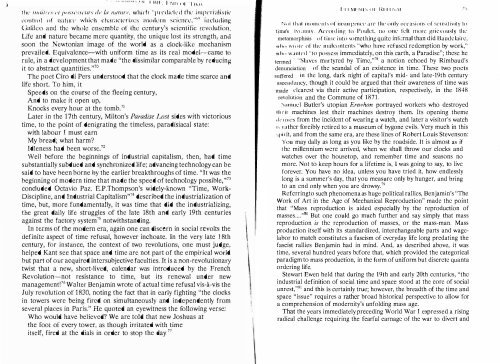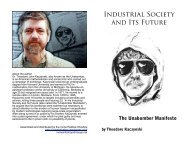CONTENTS - ouroboros ponderosa
CONTENTS - ouroboros ponderosa
CONTENTS - ouroboros ponderosa
Create successful ePaper yourself
Turn your PDF publications into a flip-book with our unique Google optimized e-Paper software.
i<br />
- - ·""II'I\ · ( jl 1 11\ 11 I· · .<br />
, NII III " 1\.11.<br />
Illl" 1I/lIi" 'f's ..t 1,/ I.\",\'I'" j'I'UrS ti,' /0 1/(1t1l1"l', which ··predicted lill' imperialistic<br />
t" Hltnll ()f l1alllrt' which charact('ri/.t"s IlHHll:rn seiellct'."I>I, including<br />
(jaliko and the whole ensemhle of the century's scientific revolution.<br />
Life and nature became mere quantity, the unique lost its strength, and<br />
soon the Newtonian image of the world as a clock-like mechanism<br />
prevailed. Equivalence-with uniform time as its real model-carne to<br />
rule, in a development that made "the dissimilar comparable by reducing<br />
it to abstract quantities."'o<br />
The poct Ciro di Pers understood that the clock made time scarce and<br />
life short. To him, it<br />
Speeds on the course of the fleeing century,<br />
And to make it open up,<br />
Knocks every hour at the tomb.7l<br />
Later in the 17th century, Milton's Paradise Lost sides with victorious<br />
time, to the point of denigrating the timeless, paradisiacal state:<br />
with labour I must earn<br />
My bread; what harm?<br />
Idleness had been worse.72<br />
Well before the beginnings of industrial capitalism, then, had time<br />
substantially subdued and synchronized life; advancing technology can be<br />
said to have heen borne hy the earlier breakthroughs of time. "It was the<br />
beginning of modern time that made the speed of technology possible,"73<br />
concluded Octavio Paz. E.P.Thompson's widely-known "Time, Work<br />
Discipline, and Industrial Capitalism"" described the industrialization of<br />
time, but, more fundamentally, it was time that did the industrializing,<br />
the great daily life struggles of the late 18th and early 19th centuries<br />
against the factory system" notwithstanding.<br />
In terms of the modern era, again one can discern in social revolts the<br />
definite aspect of time refusal, however inchoate. In the very late 18th<br />
century, fo r in st 1ince, the context of two revolutions, one must judge,<br />
helped Kant see that space and time are not part of the empirical world<br />
but part of our acquired intersubjective faculties. It is a non-revolutionary<br />
twist that a new, short-lived, calendar was introduced by the French<br />
Revolution-not resistance to time, but its renewal under new<br />
management!'" Walter Benjamin wrote of actual time refusal vis-a.-vis the<br />
July revolution of 1830, noting the fact that in early fighting "the clocks<br />
in towers were being fired on simultaneously and independently from<br />
several places in Paris." He quoted an eyewitness the fo llowing verse:<br />
Who would have believed? We are told that new ]oshuas at<br />
the foot of every tower, as though irritated with time<br />
itself, fired at the dials in order to stop the day ."<br />
,<br />
.<br />
l'I I-r-..l1 NI.\ III 1,1-1 1 1",\1<br />
Nt II 111.11 1l11IIlI('[J[S 01 iIlSIIIJ',(OIH"\' ,Ill' tlH' {lilly (HTasioilS 01 sl'llsilivily t()<br />
time's [VI 'lllllY. Aceo! ding t(l POllld, fl() one fell fTHlfC grievllusly till:<br />
metamorphisis of 1 ill 1(: iIlto something quite infernal than did Bauddairc,<br />
\,- h I wt pte of I lie malcontents "who have refused. redemption by work,"<br />
\\ II! ' w,llIled "to possess immediately, on this earth, a Paradise"; these he<br />
termed "Slaves martyred hy Time," " a notion echoed hy Rimbaud's<br />
denunciation of the scandal of an existence in time. These two poets<br />
suffered in the long, dark night of capital's mid- and late-19th century<br />
asce ,,,laney, though it could be argued that their awareness of time was<br />
made dearest via their active participation, respectively, in the 1848<br />
revolution and the Commune of 1871.<br />
S,,,,,"cl Butler's utopian Erewhon portrayed workers who destroyed<br />
II"." machines lest their machines destroy them. Its opening theme<br />
d(' r ivl's from the incident of wearing a watch) and later a visitor's watch<br />
", ,ather forcibly retired to a museum of bygone evils. Very much in this<br />
" 1 '" it, and from the same era, are these lines of Robert Louis Stevenson:<br />
You may d1illy as long as you like by the roadside. It is almost as if<br />
I he millennium were arrived, when we shall throw our clocks and<br />
watches over the housetop, and rem em her time and seasons no<br />
more. Not to keep hours for a lifetime is, I was going to say, to live<br />
forever. You have no idea, unless you have tried it, how endlessly<br />
long is a summcr's day, that you measure only hy hunger, and bring<br />
to an end only when you are drowsy. 79<br />
Refcrringto such phenomena as huge political rallies, Benjamin's "The<br />
Work of Art in the Age of Mechanical Reproduction" made the point<br />
that "Mass reproduction is aided especially by the reproduction of<br />
m1isses ... ." so But one could go much further and say simply that mass<br />
reproduction is the reproduction of masses, or the mass-man. Mass<br />
production itself with its standardized, interchangeable parts and wage-<br />
11ibor to match constitutes a fascism of everyday life long predating tbe<br />
fascist rallies Benjamin had in mind. And, as described above, it was<br />
time, several hundred years before that, which provided the categorical<br />
paradigm to mass production, in the f()rm of uniform but discrete qU1l.nta<br />
ordering life,<br />
Stewart Ewen held that during the 19th and early 20th centuries, "the<br />
industrial definition of social time and space stood at the core of social<br />
unrest,', 81 and this is certainly true; however, the breadth of the time and<br />
space "issue" requires a rather broad historical perspective to allow for<br />
a comprehension of modernity's unfolding mass age.<br />
That the years immediate1y preceding World War I expressed a rising<br />
radical challenge requiring the fearful carnage of the war to divert and






